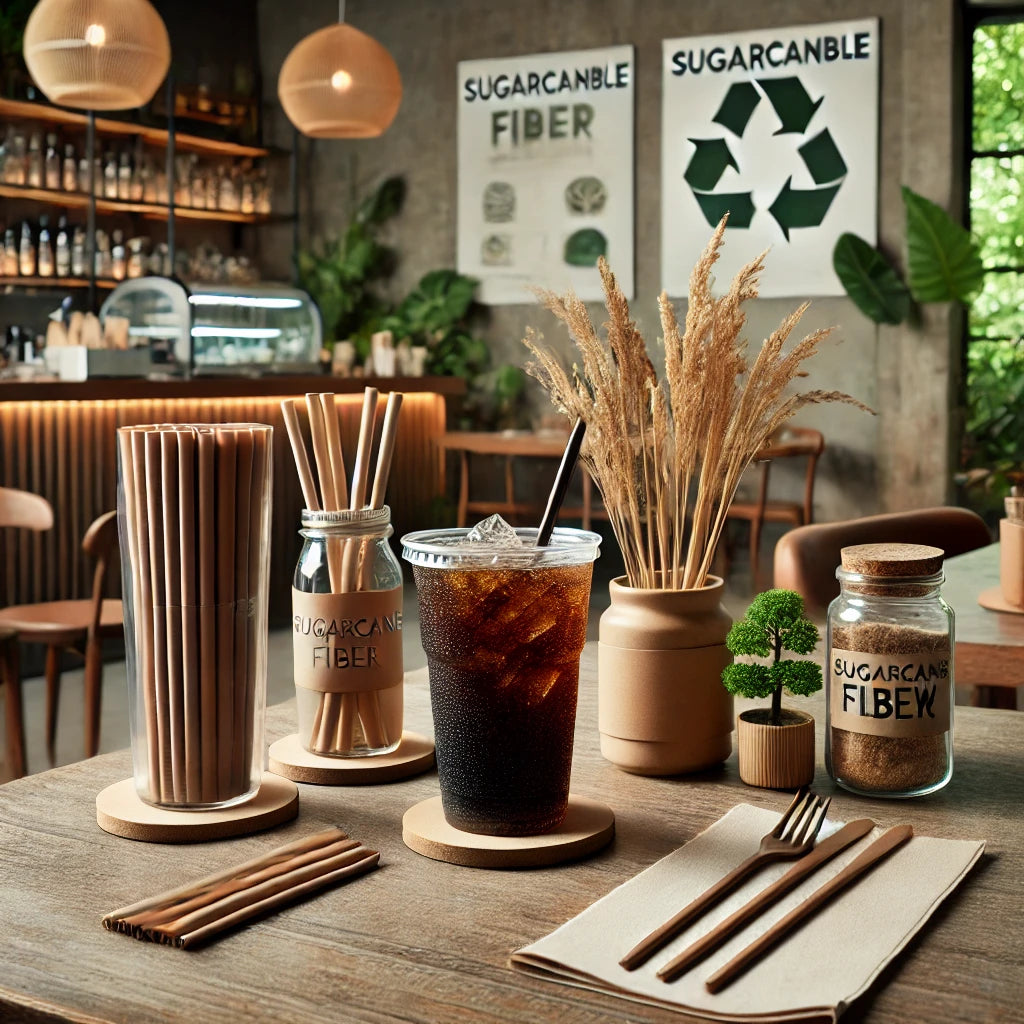
How to integrate organic straws into your sustainable development strategy?
How to integrate organic straws into your sustainable development strategy?
Organic straws have become an essential element for establishments wishing to adopt an eco-responsible approach. By integrating organic straws into your sustainability strategy, you reduce plastic waste and improve your environmental footprint. Additionally, organic straws can be made from agricultural by-products such as soft wheat or other cultivated grains.
Why choose organic straws for an eco-responsible establishment?
Adopting organic straws is perfectly aligned with the sustainable development goals of bars, restaurants, and hotels. They are made from natural materials such as sugarcane fiber, wheat straw, and grasses. This allows for the recycling of stalks and agricultural residues from crops such as oats, barley, and rye.
Organic straws offer an eco-friendly alternative to plastic straws and help reduce soil pollution from fertilizers, particularly nitrogen used in intensive farming. This also limits the production of inorganic waste while enhancing plant products such as hay or alfalfa.
The benefits of organic straws for your sustainable development strategy
Organic straws don't just replace plastic straws; they add real value to your sustainability strategy. They're compostable, recyclable, and often made from renewable raw materials such as cellulose from cereal stalks like wheat or oats. These plant-based materials can be used in eco-friendly construction or organic insulation.
Additionally, organic straw production contributes to circular agriculture by utilizing seed residues and windrows from threshing. Farmers can thus repurpose tons of products previously considered waste, such as straw bales or round bales.
Organic straws, an eco-responsible marketing lever
Integrating organic straws into your establishment isn't just a good gesture for the environment; it's also a powerful marketing tool. Consumers are increasingly aware of environmental issues, especially when it comes to reducing greenhouse gas emissions linked to plastic production. By promoting organic materials from agriculture, such as grains and legumes, you improve your establishment's image.
Additionally, agricultural waste, such as hay stalks or cereal stalks, can be transformed into biodegradable products. By adopting this approach, you also enhance the production of fodder for cattle or the use of more nutritious rations from the fermentation cycle for animal feed.
What types of organic straws should you choose for your establishment?
There are a wide variety of organic straws on the market, suitable for different types of drinks and servings. You can choose from sugarcane fiber, wheat straw, or bamboo straws. Each type of straw offers specific advantages in terms of strength, aesthetics, and compostability. Straws made from straw fiber, often made from harvested crops, also add value to acres of farmland while reducing the need to add chemical fertilizers.
Straw bales used in the manufacture of organic straw can also be a source of cellulose for other industrial applications. Recycling them helps reduce agricultural waste and promote more sustainable yields on grasslands, while also meeting the nutritional needs of cattle and cows.
How to integrate organic straws into your overall strategy?
Integrating organic straws into your sustainability strategy requires a comprehensive approach to waste management at your establishment. Start by assessing your needs in terms of the volume and type of beverages served, then choose the organic straws that best meet those needs. Straws made from soft wheat, rye, or field peas can be attractive options.
By training your staff in the use and management of organic straw, you can also encourage responsible practices such as the management of straw bales, bales or even the ensiling of agricultural residues, useful both for agriculture and for the manufacture of eco-responsible products.
Once organic straws are part of your strategy, don't hesitate to communicate about this approach. Explain to your customers how recycled materials, such as stems and seeds, are used in the manufacture of these straws. Also show how your choice of organic straws helps limit the impact of drought on crops by reusing resources already harvested.
Organic straws and the circular economy
Integrating organic straws into your sustainability strategy can also be part of a circular economy approach. By choosing straws made from agricultural waste, such as sugarcane, wheat, or grass fibers, you encourage the use of renewable raw materials and limit waste.
Organic straw often comes from threshing processes, where grain cobs are reclaimed for other uses, while the leftovers are used to make sustainable products such as straw or insulation materials. This helps maintain a balance in land use and essential nutrients to improve yields and soil fertility.
Organic straw: environmental impact and certifications
Using organic straws can significantly reduce your establishment's environmental impact. They are manufactured without hazardous chemicals and do not leave polluting residues in the environment. Their compostability, often certified, ensures that they can be disposed of in an environmentally friendly manner. Furthermore, they do not require large quantities of fertilizers to produce.
To ensure the quality of your organic straws, make sure they are certified by recognized labels, such as "OK compost" or "FSC," which guarantee that the raw materials come from sustainable sources. This also recognizes the efforts of farmers and ranchers who promote sustainable agricultural practices on the hectares of cultivated land.
Conclusion: Organic straws, an asset for your eco-responsible establishment
Incorporating organic straws into your sustainability strategy is a great way to reduce your environmental impact while meeting your customers' expectations. They're compostable, made from renewable materials like grain, rye, or wheat, and reinforce your establishment's image as an eco-responsible player.
By switching to organic straws, you're not only making an environmental choice, but you're also adopting a marketing strategy that highlights your commitment to the planet. Customers, concerned about the impact of the products they consume, will appreciate knowing that you're recycling agricultural waste such as straw bales and bales, and that you're contributing to a more sustainable production chain.
Organic straws therefore fit perfectly into a global strategy of waste reduction and management of plant-based raw materials, by recovering agricultural residues and reducing the ecological footprint of CHR establishments.
